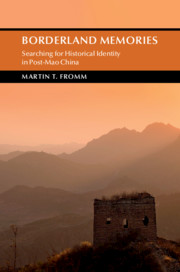Book contents
- Borderland Memories
- Cambridge Studies in the History of the People’s Republic of China
- Studies of the Weatherhead East Asian Institute, Columbia University
- Borderland Memories
- Copyright page
- Dedication
- Contents
- Acknowledgments
- Introduction
- 1 Reconfiguring Cultural Production in the Post-Mao Transition
- 2 Borderland Ambiguities in Narratives of Modernization and Liberation
- 3 Relocating the Nation outside the Nation
- 4 The “Historical Science” of Wenshi Ziliao
- 5 Affective Community and Historical Rehabilitation
- 6 Mobilizing a “Patriotic United Front”
- 7 Local, Regional, and National Dynamics of Wenshi Ziliao Production
- Conclusion
- References
- Index
- Studies of the Weatherhead East Asian Institute, Columbia University
4 - The “Historical Science” of Wenshi Ziliao
Published online by Cambridge University Press: 18 February 2019
- Borderland Memories
- Cambridge Studies in the History of the People’s Republic of China
- Studies of the Weatherhead East Asian Institute, Columbia University
- Borderland Memories
- Copyright page
- Dedication
- Contents
- Acknowledgments
- Introduction
- 1 Reconfiguring Cultural Production in the Post-Mao Transition
- 2 Borderland Ambiguities in Narratives of Modernization and Liberation
- 3 Relocating the Nation outside the Nation
- 4 The “Historical Science” of Wenshi Ziliao
- 5 Affective Community and Historical Rehabilitation
- 6 Mobilizing a “Patriotic United Front”
- 7 Local, Regional, and National Dynamics of Wenshi Ziliao Production
- Conclusion
- References
- Index
- Studies of the Weatherhead East Asian Institute, Columbia University
Summary
Wenshi ziliao participants at the local, regional, and national levels adapted the slogan “seeking truth from facts” to reconceive of editorial “truth seeking” in ways that reconciled objective historical inquiry with ideological imperatives. To build a nationalist United Front and balance liberal inclusivity with political control, organizers reinterpreted socialist concepts like “dialectical and historical materialism” to rationalize the reincorporation of alienated social groups and to accommodate diverse local perspectives. In the northeast borderland, this reworking of socialist ideology provided the conceptual tools for reevaluating narratives of nation, revolution, liberation, heroism, and wild frontier in ways that stretched the limits of the national Party-centered discourse. Local editors attempted to reconcile multiplicity and unity, while provincial editorial boards sought to impose more centralized control over the collection and editing process, regarding the pursuit of historical truth as contingent on “systematization and specialization.” While some local editors employed an inclusive interpretation of ""seeking truth from facts,"" others regarded informants and writers as an ideological problem of “confusing historical truth and falsity” and intervened in the oral history process with Party-approved narrative frameworks.
Keywords
- Type
- Chapter
- Information
- Borderland MemoriesSearching for Historical Identity in Post-Mao China, pp. 110 - 153Publisher: Cambridge University PressPrint publication year: 2019

